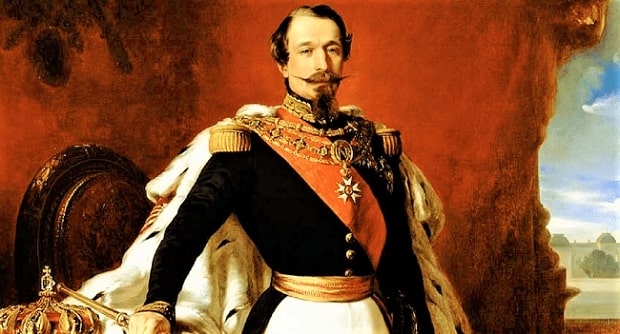Napoleon III (born April 20, 1808, in Paris, and died on January 9, 1873, in Chislehurst near London) was born as Charles Louis Napoléon Bonaparte he was the Second Republic French President from 1848 to 1852 and Emperor of the French from 1852 to 1870.
With the coup d’état on December 2, 1851, the president, who emerged from a popular election, had a dictatorship built. A year later he proclaimed himself emperor and his country the second empire. Parliament was largely disempowered and only gained a little more power at the end of its reign.
Due to the plebiscitary character of his reign, the emperor was practically forced to show new successes in order to maintain the favor of the masses. This led to a relatively expansionary foreign policy, which also pursued the goal of expanding France’s territories at the expense of its neighboring countries.
The Emperor was initially successful in the Italian unification war in 1859. However, the planned annexation of Luxembourg in 1867 failed. Napoleon’s aggressive foreign policy led to the question of the Spanish succession to the Franco-Prussian War ended.
After Napoleon was captured on September 2, 1870, a new national government was formed in Paris, which declared him deposed and proclaimed the republic. He spent his last two years in exile in England.
The Early Life of Napoleon III
Louis Napoleon Bonaparte was born in Bordeaux. His father was Louis Bonaparte, King of Holland, younger brother of Napoleon I, and his mother Hortensia de Beauharnais, therefore his political career was built on the fact that he was a relative (nephew) of Napoleon I.
After the final defeat of Napoleon I and his deposition in 1815 and the restoration of the Bourbon monarchy in France, by the law of January 1, 1816, all Bonaparte were exiled from French territory. Queen Hortensia went into exile in Switzerland with her children and bought, in 1817, the castle of Arenenberg (Switzerland), which overlooks Lake Constance.
The future emperor attended the Lyceum in Augsburg and acquired his first martial skills from a former officer of Napoleon I. In 1830 he was a volunteer in the Swiss army, where he obtained the rank of artillery captain in 1834.
The young Louis-Napoleon resided in addition to Switzerland, Germany, and Italy. As a young man in Italy, he and his brother Napoleon Louis were involved in the protests of the Carbonarios, an organization of the Italian resistance, related to Freemasonry, which was fighting against Austrian domination in northern Italy.
Marriage, son and family
Napoleon III Married to Eugenia de Montijo (countess of Teba), a Spanish noblewoman of Scottish and Spanish descent, Napoleon III had a son, Eugenio Bonaparte (Napoléon Eugène Louis Jean Joseph Bonaparte, 1856-1879), who on Napoleon’s death became head of the family and was called by his supporters Napoleon IV.
Succession of Bonapartism
According to the succession law that Napoleon I had established during the First Empire, the prelature for the imperial throne was: his direct legitimate offspring and then his brothers and offspring.
The first in the order of succession was his son: the king of Rome. He was followed by José Bonaparte, King of Naples and Spain, and later by Luis Bonaparte, King of Holland, and his sons. Luciano Bonaparte, prince of Canino, and his descendants were excluded from the imperial succession.
As Joseph had no male child, and his brother Napoleon Louis Bonaparte (1804-1831) and his cousin Napoleon II in 1832 preceded him, Louis-Napoleon became Bonaparte’s heir to the next generation.
Fight for power
Already the heir to Bonapartism and resident in the United Kingdom, he secretly returned to France in October 1836, for the first time since childhood, to attempt a coup d’etat in Strasbourg. The blow failed, but he was able to escape.
Again, he attempted another coup in August 1840, crossing the English Channel with a small ship with some soldiers at Boulogne-sur-Mer. Caught, this time he was imprisoned under a regime of relative comfort in the fortress of the city of Ham.

